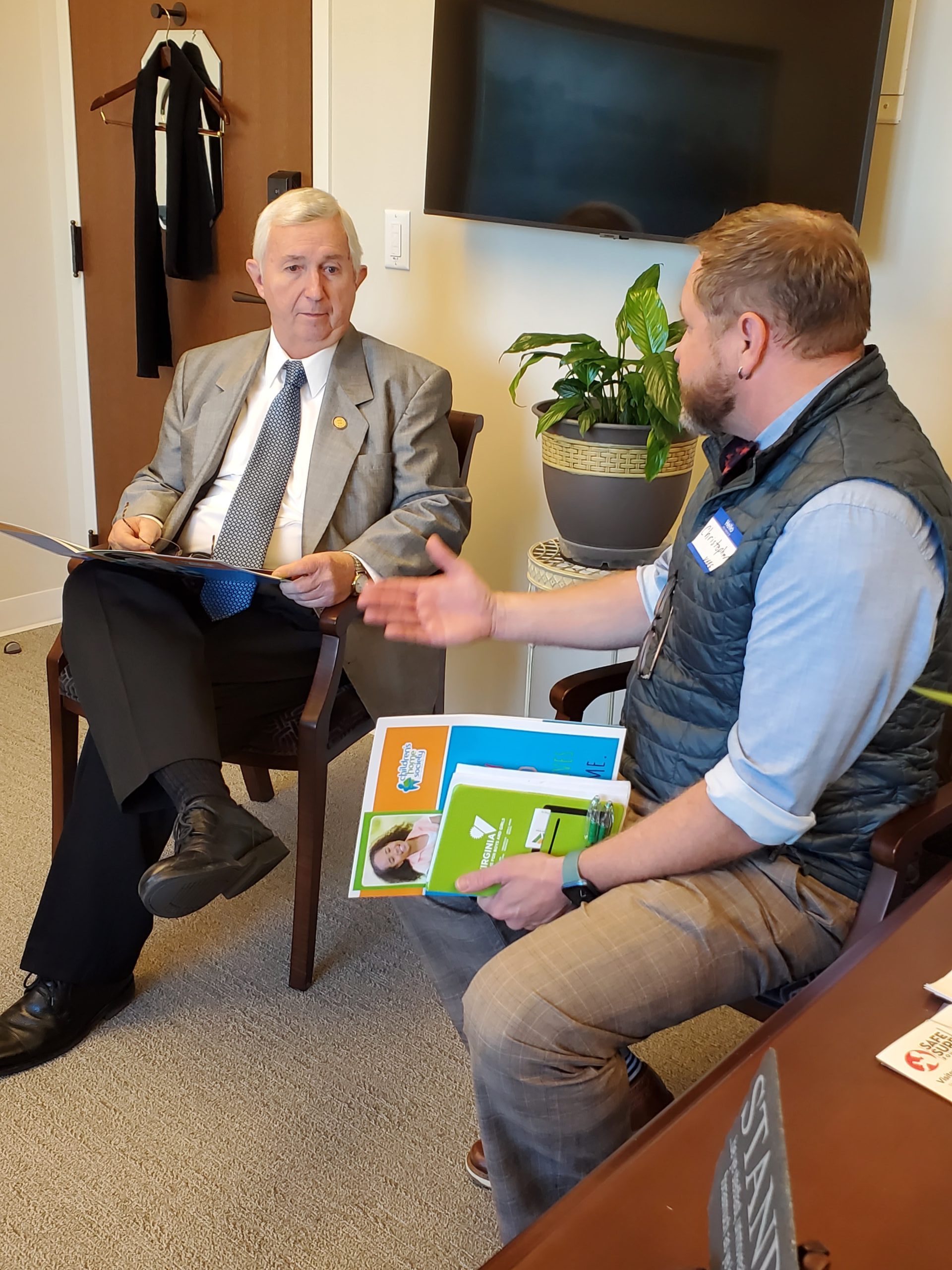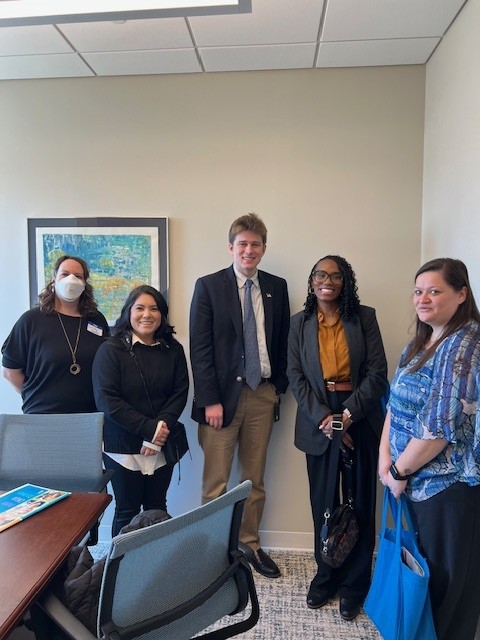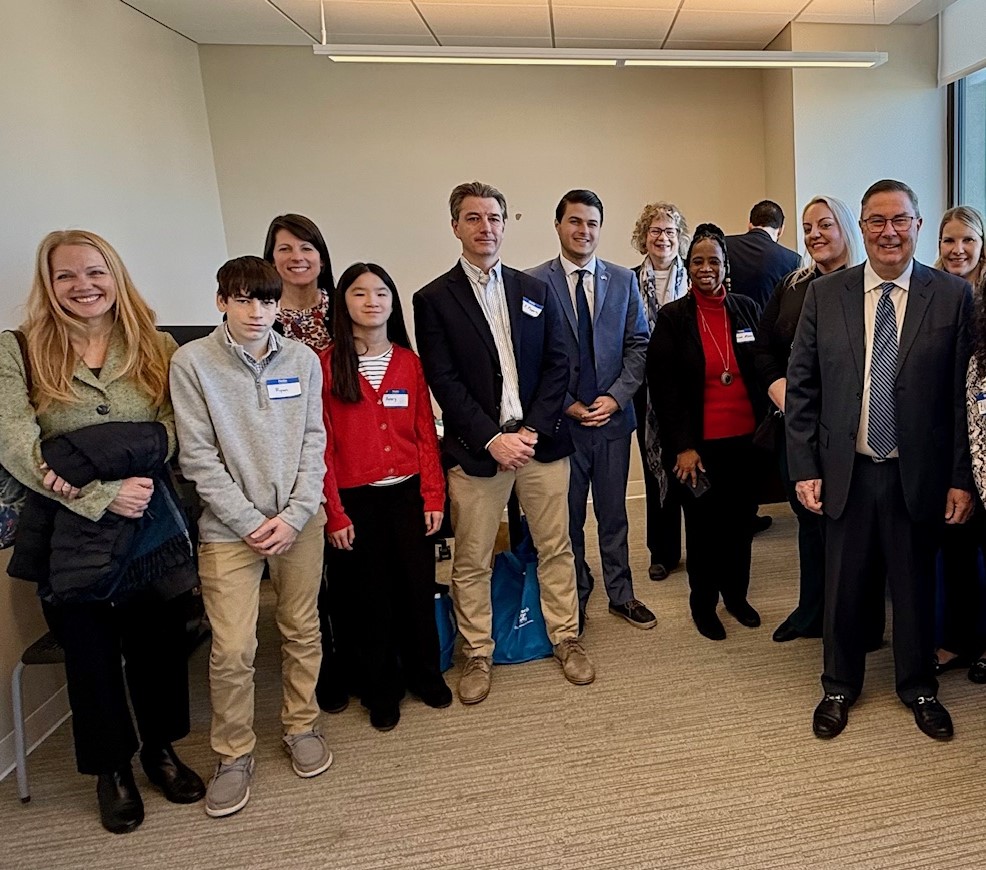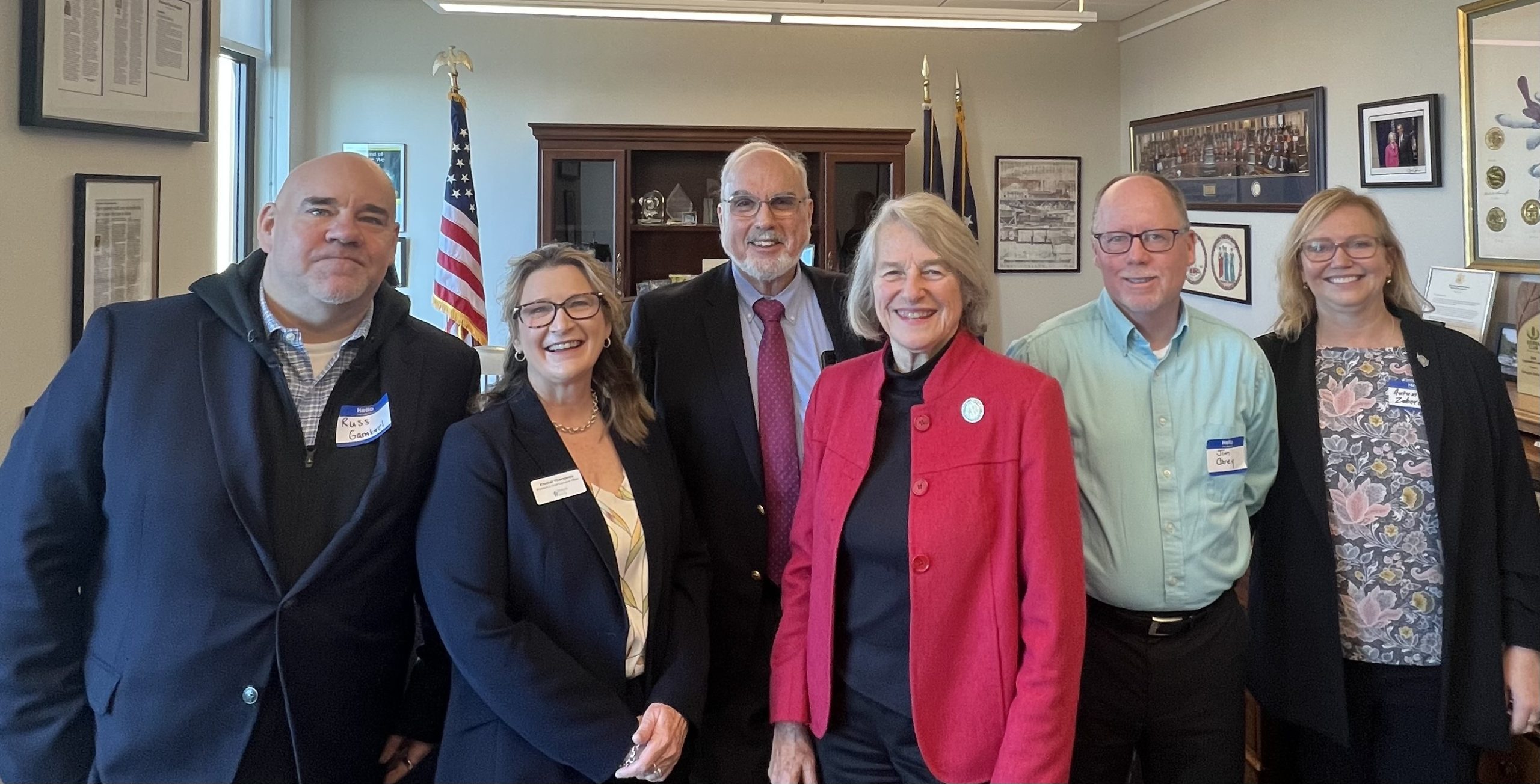On Foster Advocacy Day 2025 in Richmond, VA, advocates, families, and community leaders came together at the Virginia State Capitol to raise awareness and champion the needs of foster youth. The event powerfully reminded participants of the importance of advocacy in shaping policies that directly impact the lives of children in foster care. From meeting with legislators to sharing personal stories, participants worked eagerly to inspire change and build a brighter future for Virginia’s youth.
Understanding the Virginia General Assembly: Where Policy Changes Begin
Foster Advocacy Day takes place during The Virginia General Assembly session each winter.
The Virginia General Assembly is the legislative body of the Commonwealth of Virginia, located in the heart of Richmond. It plays a crucial role in shaping the laws and policies that affect all Virginians. The General Assembly consists of two chambers: the Senate and the House of Delegates. Together, these elected officials propose, debate, and pass legislation on a wide range of issues, from education and healthcare to foster care and adoption. For advocates, the General Assembly is a key place to meet with legislators, educate, and advocate for policy changes that can improve the lives of Virginia’s children and families.
The Virginia General Assembly typically meets annually. The regular session begins on the second Wednesday in January and lasts 60 days in odd-numbered years (when the state budget is typically reviewed and approved) and 45 days in even-numbered years. Additionally, the Governor can call special sessions as needed to address specific issues or emergencies, such as budget adjustments or urgent legislative matters.
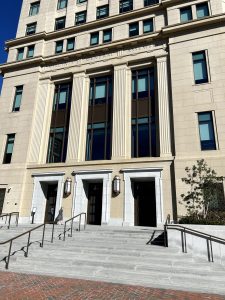
The Power of Advocacy: Giving Foster Youth a Voice
Foster care advocacy is crucial in ensuring that the voices of children and families in the foster care system are heard and their needs are met. Advocates play a vital role in raising awareness about the challenges faced by foster youth, such as housing instability, lack of supportive resources, and limited access to education and healthcare. By speaking out and engaging with policymakers, advocates help drive meaningful change, pushing for policies that improve the foster care system, enhance support for foster and adoptive families, and promote the overall well-being of children and youth. Through their efforts, advocates help create a future where every child in foster care has the opportunity to thrive.
For more than 125 years, Children’s Home Society of Virginia has steadfastly advocated for at-risk children and youth, providing a wide range of services to strengthen families and support children in need. From our early roots in adoption services to our current programs that also focus on helping aged-out foster care youth and post-adoption services, we have been dedicated to impacting the lives of Virginia’s most vulnerable children. Through tireless commitment to advocacy and support, Children’s Home Society of Virginia continues to ensure that every child, no matter their background, has the opportunity for a safe, stable, and promising future.
This year’s Foster Advocacy Day in Richmond saw a fantastic turnout, with a diverse group of participants, including our adoptive families and foster youth alumni, as well as participants from our partner organizations like Voices for Virginia’s Children, CASA, Speak Out, Intercept, C2Adopt, Emerging Phoenix, Virginia’s Kids Belong, Virginia Home for Boys and Girls, Patty’s Hope, and Lena’s Adventures. The presence of these groups, each with their own focus on improving the foster care system, brought together a community of individuals with powerful stories to share. The impact of families and youth sharing their personal journeys was profound, as it gave attendees, including legislators, a deeper understanding of the real-world challenges faced by those involved in the system.
The heartfelt stories from foster care youth and alumni were especially impactful. By bravely sharing their experiences and recommendations for a better system, these young people allowed legislators to see the bills before them in a completely different light. Personal stories offer an emotional connection that statistics and facts alone cannot provide—they make us pause, reflect, and recognize the humanity in every policy decision. Hearing directly from those who have lived through the foster care system made the need for change even more urgent and real. Through these shared experiences, advocates can truly drive meaningful policy reform, ensuring that foster youth and families receive the support they deserve.
Top Priority 2025 Foster Care Bills and Foster Care-Related Budget Items
While we are supporting many initiatives during this General Assembly session, our top priorities this session have been:
- SB 773 Foster care; housing services; housing plan; report (Favola)
- HB 1964 Future in Focus Program (Tata)
- HB 1777 Office of Children’s Ombudsman; foster youth right to receive information (Sullivan)
- HB 1617 Homeless youth; fees; certain government documents (McClure)
- Budget amendments to expand searching for relative and fictive kin and the Future in Focus program
Senate Bill 773
Senate Bill 773 is a significant piece of legislation in Virginia that aims to enhance housing support for individuals transitioning out of foster care. Introduced by Senator Barbara Favola, the bill mandates that local social services departments develop comprehensive housing plans for youth aging out of foster care. These plans must detail the housing options being pursued and explain why each option is in the individual’s best interest.
Additionally, SB 773 grants the Department of Social Services the authority to collaborate with local public housing authorities or housing programs to facilitate access to grant dollars for the Foster Youth to Independence Initiative under the Family Unification Program Housing Choice Vouchers. The bill also directs local departments of social services to work with local housing authorities to secure these vouchers for eligible youth. Furthermore, it requires the Commissioner of Social Services to provide annual reports to the Governor and General Assembly on housing services for individuals aging out of foster care, ensuring ongoing oversight and improvement of these critical support systems.
House Bill 1964
House Bill 1964, known as the Future in Focus Program, is a legislative initiative in Virginia designed to support young adults transitioning from foster care to independent adulthood. Introduced by Delegate Anne Ferrell Tata, the program offers support services and financial assistance to individuals aged 21 through 23 who participated in the Fostering Futures program immediately prior to turning 21. The Future in Focus Program is voluntary and aims to assist participants in becoming self-sufficient and establishing permanent, positive relationships.
Advocates worked hard and were excited to see this bill pass the House. Unfortunately, it was passed by indefinitely by the Senate Finance and Appropriations committee, meaning this program will not be codified this year. We will continue to advocate for this critical program in future years to ensure all youth who have aged out of foster care need the supports they need to thrive.
House Bill 1777 and Senate Bill 1406
House Bill 1777, introduced by Delegate Sullivan, and Senate Bill 1406, introduced by Senator Salim are is a legislative measure introduced in Virginia to enhance accessibility to the Office of the Children’s Ombudsman for children and youth in foster care. The bill mandates that the Department of Social Services, local departments of social services, children’s residential facilities, and child-placing agencies provide specific information to biological parents, prospective adoptive parents, foster parents, and children in foster care aged 12 and older upon the initiation of a foster care case. This information includes contact details for the Office of the Children’s Ombudsman, ensuring all parties know avenues for addressing concerns and seeking assistance.
Additionally, the bill grants the Office of the Children’s Ombudsman the authority to communicate directly with children in foster care without requiring consent from DSS, local departments, residential facilities, child-placing agencies, or foster parents. This provision empowers the Ombudsman to independently investigate and address issues raised by foster youth, promoting a more responsive and child-centered approach to oversight.
By implementing these measures, this bill aims to strengthen the rights of foster youth and their families and ensure they have access to essential information and support systems. This initiative reflects a commitment to improving the foster care experience and upholding the well-being of children in the system.
We are thrilled that both the House and Senate voted unanimously to pass this bill. This bill will now head to the Governor’s desk and should the Governor sign the bill, it will officially be enacted as law in the Commonwealth.
House Bill 1617
House Bill 1617 is a legislative measure introduced in Virginia to support homeless youth by eliminating fees associated with obtaining essential documents. The bill stipulates that homeless youth shall not be charged fees for:
- Vital Records like birth certificates
- Health Records
- Driver’s Permits
This initiative aims to reduce the financial barriers that homeless youth often face when accessing critical documents necessary for securing housing, employment, and education. By removing these financial obstacles, HB 1617 aims to empower homeless youth, providing them with the tools needed to build a more secure and self-sufficient future.
We are also thrilled that both the House and Senate passed this bill unanimously and hope the Governor will sign this bill into law.
Budget Amendments
In the 2025 Virginia General Assembly, a budget amendment was introduced to enhance the Department of Social Services’ efforts in locating relative and fictive kin for youth entering foster care. This initiative allocates $425,750 from the general fund for the second year (FY2026) to expand the existing program, aiming to identify and engage potential kinship placements at the time of entry into foster care or when an out-of-home placement is necessary. The current program primarily targets youth aged 12-17 who are placed in congregate care or have been in foster care for twelve months or more without placement with kinship foster parents.
The proposed expansion seeks to broaden eligibility, ensuring that more youth can be placed with relatives or fictive kin, promoting stability and continuity in their lives. This initiative aligns with ongoing efforts to increase kinship placements, which have shown positive outcomes for children in foster care. For instance, Virginia has increased the percentage of children placed in kinship care from 12.9% in January 2023 to 18.4% in September 2024.
By investing in expanding this program, the General Assembly aims to provide more children with the benefits of kinship care, including stronger familial connections and improved emotional well-being.
A budget amendment was also introduced to support the Future in Focus Program, originally known as the Bright Futures Program. This initiative aims to assist young adults transitioning from foster care to independent living by providing financial support for housing costs. The proposed amendment allocates $1.6 million from the general fund for the second year (FY2026) to fund the fiscal impact of House Bill 1964, which establishes the Future in Focus program.
The Future in Focus Program is designed to offer a monthly maintenance care payment to individuals aged 21 to 23 who participated in the Fostering Futures program before turning 21. The stipend amount decreases gradually each year until the individual’s 24th birthday, providing a structured transition to self-sufficiency. The funding from the budget amendment is intended to cover the costs associated with implementing and administering this program, ensuring that eligible young adults receive the necessary support during this critical period of their lives.
By investing in the Future in Focus Program, the General Assembly demonstrates a commitment to supporting youth aging out of foster care, helping them achieve stability and independence as they transition into adulthood.
We eagerly await the final approved budget and are confident our advocacy efforts will result in improvements to the foster care system.
Empowering Change: Supporting Foster Care Advocacy is Crucial for Virginia’s Youth
To help support our foster care advocacy work, everyone can contact their legislators! We each have legislators who represent us, and they need to hear from people they directly represent, their constituents, to know these issues are important to those in their district. You can find out who your representatives are by using this link: Who’s My Legislator?
“In terms of making systemic change, we need to spread more awareness to the general public. As a state, we have so many youth aging out of foster care, and it’s something the general public needs to be aware of. Having more conversations will ultimately reach the people who can adopt.” – Cassie Plevelich, CHSVA Chief Operating Officer
If you want to learn more about raising awareness or how you can be a part of our advocacy work, please reach out to Cassie for more information: 804-353-0191, ext. 334 | [email protected]
